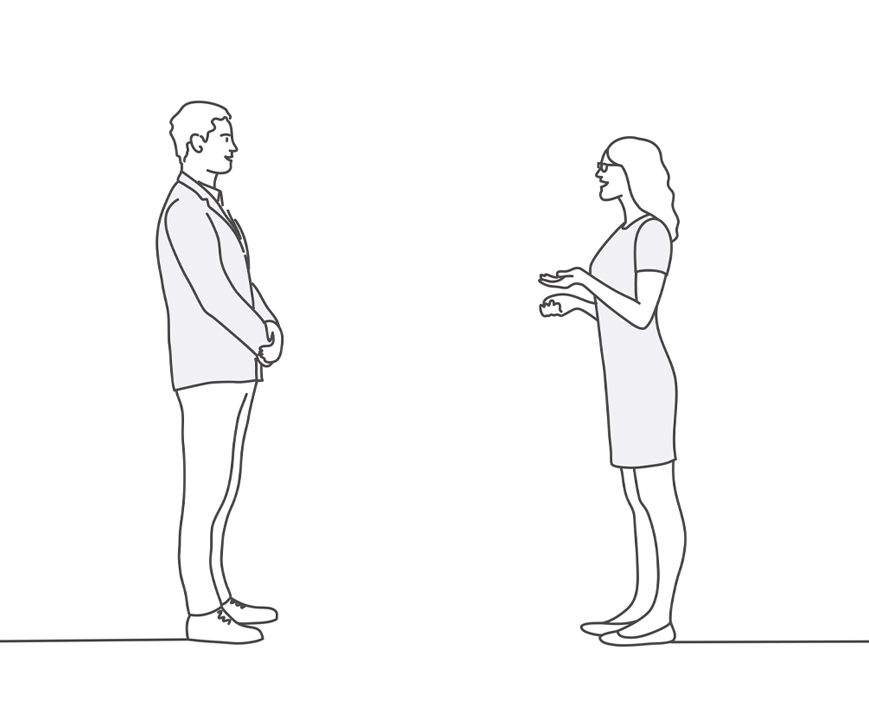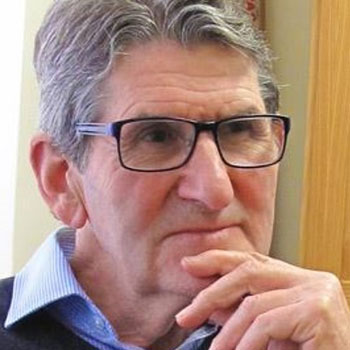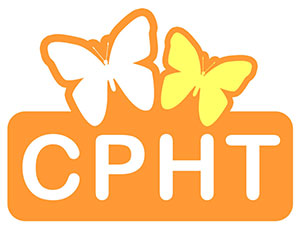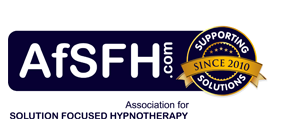Solution Focused Hypnotherapy
Find out more about Solution Focused Hypnotherapy
- What is Solution Focused Hypnotherapy (SFH)?
- What is Hypnosis and is it safe?
- How is Solution Focused Hypnotherapy different to other types of hypnotherapy?
- How does Solution Focused Hypnotherapy help?
- What can I expect during an Initial Consultation for Solution Focused Hypnotherapy?
- What can I expect during a typical Solution Focused Hypnotherapy session?
- History of Solution Focused Hypnotherapy
- How can I train to become a Solution Focused Hypnotherapist?
For further reading...
Solution Focused Hypnotherapy is a modern type of talking therapy that uses solution focused questioning techniques combined with trance, helping people to make positive, lasting changes in their lives
What is Solution Focused Hypnotherapy?

Solution Focused Hypnotherapy is a type of 'talking therapy', that combines the use of psychotherapy with hypnosis. Hypnosis or 'trance' is a very natural, relaxing state, encouraged by using guided relaxation, where the mind can relax and then focus on thoughts and suggestions that might be useful. As a modern psychotherapeutic approach, Solution Focused Hypnotherapy uses practical, structured, and well-researched strategies to help people make significant, positive changes in their lives in a relatively short period of time. Crucially, in Solution Focused Hypnotherapy, therapists look at what the client wants to achieve (the solution) rather than at whatever prompted them to seek help (the problem).
What is hypnosis and is it safe?

Hypnosis or trance describes times when we experience a shift in our conscious awareness. Trance used during hypnotherapy is very different from the kind of things we might see in 'stage hypnosis'.
In our day to day lives, we all naturally go in and out of trance states many times during the day - perhaps when we are driving, reading a good book or even washing the dishes. In this relaxed state, we experience changes in our conscious awareness - almost like being in a daydream. During this time, the unconscious mind is more aware and can focus on helpful suggestions and thoughts.
Trance is a very natural and safe state. Contrary to what you might see on the television, trance is not mind-control! When we are in a trance state we are still in control, and we process and decide whether information or suggestions are useful to us or not and will not accept or do anything against our will.
Being in a trance is a very relaxing experience - and it is something that all of us will frequently experience in our daily lives. In fact, experiencing changes in our conscious awareness is a vital part of our existence as humans - we need times where we can relax, reflect, and consolidate information, and utilise different parts of our brains for different activities.
From a scientific perspective, changes in conscious awareness can be demonstrated using Electroencephalography or EEG, which is a method of recording electrical energy in the brain. Our brain wave activity changes all the time, particularly as we enter different phases of when we go to sleep. When your therapist uses guided relaxation and mental imagery, it can encourage you to go into a trance state, which causes a natural shift in our brainwave patterns. This means that we might shift from being in a fully alert mental state (like when we're busy working during the day that increases beta brain wave activity) into other states. As we are guided into deeper levels of relaxation, the brain demonstrates more alpha and theta wave activity, where we feel calmer and more relaxed but can also visualise images and reflect on different ideas that may be useful to us.
This is why Solution Focused Hypnotherapy can be so beneficial, because it combines powerful solution-focused discussions, followed by encouraging a relaxing trance state so that the ideas and solutions discussed can then be explored and utilised by the brain for positive benefit.
How is Solution Focused Hypnotherapy different to other types of hypnotherapy?

Unlike other forms of Hypnotherapy, Solution Focused Hypnotherapy uses a specific structure, which incorporates several aspects of Solution Focused Brief Therapy (SFBT) and combines these with an understanding of how the brain works, in combination with using trance. Solution Focused Hypnotherapy is also different because it doesn't require the therapist to 'dig into' a person's past, as this is not deemed necessary to help the person formulate plans and best hopes for how they want to move forward in their lives in the future.
How does Solution Focused Hypnotherapy help?

At its heart, Solution Focused Hypnotherapy focuses on the present and the future and not on the past. A Solution Focused Hypnotherapist will ask clients to consider their preferred future, for instance asking solution-orientated questions such as: What would be better if the problem had improved? or What would have changed?. This enables the client's possible solutions to become more obvious and gives the client a goal to work towards.
Hypnosis itself reduces anxiety, and this is done very simply through relaxation and visualisation, allowing the client to focus on the positive aspects of their life that encourages a shift in perspective.
Through working with the client in a collaborative way, Solution Focused Hypnotherapists can also help individuals experiencing confidence and self-esteem issues. It can also help in addressing symptoms of stress, low mood, anxiety (including panic attacks), and in helping people to cope better with physical issues such as Irritable Bowel Syndrome (IBS) and certain chronic pain conditions. Specific phobias such as fear of spiders, water, flying, and public speaking can also be minimised, along with painful memories and traumatic experiences.
What can I expect during an initial consultation for Solution Focused Hypnotherapy?

Although there may be some variations depending on your practitioner, the timescales involved and the reasons you are seeking therapy, an Initial Consultation with a Solution Focused Hypnotherapist will usually involve the following:
- Completion or signing of a consent form, which may include terms and conditions of therapy, and how your data will be utilised and protected (you may be asked to complete this prior to the Initial Consultation).
- Discussion of the issues for which you are seeking help and how you would like things to be different, including your goals and best hopes for how you would like things to be in the future (this could include a wide variety of things, such as wanting to feel more relaxed or confident, to cope better with things in your life, or to overcome a phobia. Goals may also include wanting to change certain behaviours, such as to sleep better, to create better eating habits or to stop drinking too much - and many other things for which Solution Focused Hypnotherapy can be beneficial).
- Gathering of general information such as your contact details, any history or conditions that you might feel are relevant, and other details that can help your therapist assess how best they can help you.
- Discussion of how the brain works, how we experience emotions in the way that we do and how these can affect us and our habits, and what we can do to change these. Discussions will also include details about what trance is, and how it is a very normal and natural state, and what you can expect from your sessions.
- Your therapist will also give you an indication of the likely number of sessions that may be required, which will differ depending on your circumstances and the reasons for seeking therapy.
- You will also be provided with a relaxation recording to listen to (either as a CD or an online copy), for you to use in between your sessions, which can help you relax and reinforce the benefits of hypnotherapy.
The initial consultation is a great way for you and your therapist to get to know each other and to discuss the reasons why you're seeking support, as well as your goals and best hopes for moving forwards in your life. It is also a good opportunity to ask any questions about the process, so that you can feel comfortable and informed about what will happen and how it will help.
What can I expect during a typical Solution Focused Hypnotherapy session?

During a typical session, your Solution Focused Hypnotherapy practitioner will start off by asking you about your week (or during the time since your last session). This will help you to discuss what positive things have been going on, and whether you have noticed or made any changes in your life that are moving you nearer to your goals. Following this, your Solution Focused Hypnotherapist will discuss aspects about how the brain works and how it relates to your experiences.
Discussions involving some solution focused questions and other techniques will then help you to consider and refine your solutions that can help you to move forward in your life. Depending on your circumstances, these discussions may also involve other elements of Solution Focused Brief Therapy (SFBT), Cognitive Behavioural Therapy (CBT) and Neuro Linguistic Programming (NLP) as appropriate.¨
After this, you'll then be invited to quietly relax (usually in a chair or on a couch), whilst your hypnotherapist speaks and guides you gently into a relaxed state, where you can enjoy resting in a day-dream-like trance state, where your mind can focus on and further absorb and reflect on the things that have been discussed during the session.
During the session, your therapist may also use other measures to gauge how things are going, such as using a GSR monitor (a small device that uses finger sensors to painlessly measure stress levels), or ask you to respond to items on various rating scales, which can highlight changes in how you are feeling as you progress through your sessions.
So, are you ready to start making some positive changes in your life? Find a Solution Focused Hypnotherapist here!
History of Solution Focused Hypnotherapy?

How did Solution Focused Hypnotherapy begin?
The foundations of Solution Focused Hypnotherapy (SFH) as a therapeutic intervention are underpinned by the approaches of several notable individuals - from an original founder of clinical hypnotherapy, Milton Erickson, to the creators of solution-orientated therapy. Many of the ideas, techniques and approaches still form the basis of modern Solution Focused Hypnotherapy (SFH) today.
Hugely influential in the development of SFH, Milton Erickson was a firm believer in finding solutions. Between the 1950s up until his death in 1980, he had continued to develop and refine his techniques in the practice of hypnosis and psychotherapy. Among his most famous techniques, the use of anecdotes, metaphors and client-centred therapy have endured as major approaches in modern therapy, and specifically for those specialising in Solution Focused Hypnotherapy.
Equally influential, in the 1980s the Family therapy unit in the US saw the evolution of the 'Miracle Question' and other solution-focused questioning techniques by Insoo Kim Berg and Steve de Shazer. These techniques have evolved over the years and now provide a core focus for Solution Focused Brief Therapy (SFBT) and for Solution Focused Hypnotherapy. In addition to the work of Erickson, Steve de Shazer and Insoo Kim Berg, research has also indicated the benefits of explaining fundamental aspects of how the brain works as part of the therapeutic process. This has led to the so-called 'Brain-based Therapy' (BBT) approach, where clients are involved in understanding how the brain works, how their issues can manifest themselves and how such issues can be addressed. This provides another key cornerstone in the application of modern Solution Focused Hypnotherapy techniques.
However, it was David Newton who played a pivotal role in bringing these influences together into a cohesive and structured therapeutic approach. In the early 1990s, drawing from his extensive knowledge of psychotherapy, neuroscience, and hypnotherapy, Newton pioneered what would become Solution Focused Hypnotherapy. Recognizing the effectiveness of solution-focused techniques, he integrated them with Ericksonian hypnosis and neuroscience-based psychoeducation, ensuring that clients not only benefited from trance work but also gained a clear understanding of how their minds functioned. Newton’s structured yet adaptable framework allowed therapists to guide clients towards positive change by focusing on solutions rather than problems, making SFH a distinct and highly effective therapeutic method which has now been backed up by peer reviewed research.
Through his work, Newton inspired a new generation of therapists, equipping them with practical tools and a clear methodology for helping clients achieve positive change. His legacy continues today, with SFH practitioners worldwide following the principles he set out, combining scientific understanding with therapeutic techniques to create a client-centred, forward-focused approach. Thanks to Newton’s contributions, SFH remains a progressive and evolving field, continuously shaped by research and practice, yet always rooted in the core principles he established.
Looking to the future
We understand the huge benefits of Solution Focused Hypnotherapy and our members have helped countless numbers of people to change their lives for the better. Many therapists will have been inspired by the positive benefits of Solution Focused Hypnotherapy in their own lives, prompting many to train in the discipline itself to further help others.
How can I train to become a Solution Focused Hypnotherapist?
The most popular route to train as a Solution Focused Hypnotherapist, requires training with an accredited training school to receive a specialist diploma in Solution Focused Hypnotherapy. Alternatively, some people may also train in standard hypnotherapy and complete additional training in solution focused methods.
The AfSFH is proud to represent a growing number of qualified and student Solution Focused Hypnotherapists. All AfSFH Registered members must have completed appropriate training to be eligible to join, which requires a qualification in Solution Focused Hypnotherapy (SFH) or equivalent joint prior learning qualifications in hypnotherapy and solution focused methods. You can see the eligibility criteria here: https://www.afsfh.com/join-us.
Many of our members have undergone dedicated training in SFH via Clifton Practice Hypnotherapy Training (CPHT) schools, who have training schools all over the country. You can find a list of schools here: https://www.cpht.co.uk/schools .

How do I specialise in Solution Focused Hypnotherapy?
If you are already qualified as a hypnotherapist, you can train to become a specialist in Solution Focused Hypnotherapy by completing an additional solution focused methods course. You can find further details about such courses on the CPHT website.
© 2021 AFSFH All rights reserved
The Association for Solution Focused Hypnotherapy
(AfSFH) is a not-for-profit organisation
Company Registration no. 7412098 © AfSFH
